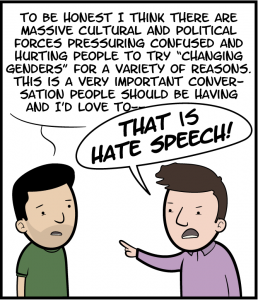Last week, I had a chance to discuss my beliefs with a coworker, who I will call Nick for this post. I don’t think it lasted more than five minutes, but I feel there was a lot I told Nick in those five minutes. Enough information at I worried I was overwhelming him with more than he really wanted to know.
I won’t get into a lengthy backstory about how the conversation came up. I’ll just note that we were discussing a different topic and I made him ask me if I had any religious beliefs. I said, “Yeah, I’m actually a witch.” He asked me to clarify what that meant and over a period of five minutes I told him about my personal affinity for the Norse deities, what I perceived as the subtle differences and relationship between the terms Wiccan, witch, and Pagan, and a brief bit about my beliefs surrounding magic. Eventually, the conversation was over and we both fell silent as we continued doing our jobs.
I was instantly reminded of this experience later in the week when Libby Anne posted a link to an article about evangelical Christians looking for ways to “share the gospel.” The article talked about how evangelicals weren’t doing it enough (as determined by the author of the article, I guess) and often struggled with it. Given how easily I just discussed my beliefs with a coworker mere days before, I found this somewhat amusing. I considered why it was so much easier for me, and I wanted to share my thoughts on the matter with my readers.
I was only interested in sharing what I believed.
Nick asked me a question about a topic that is important to me and that I’m passionate about, and I told him about it. But in the end, I was just sharing information with him about what I believe. I had neither the desire nor the need to get Nick to strip down1 and declare his devotion to Freyja. I wasn’t out to convince him that lighting certain candles would somehow shape what happened in the future. All I expected him to do is listen to the answers I gave him like any polite person who asked any question.
To most evangelical Christians (and to me, back when I was counted among their number), “sharing the gospel” is not about usually just about telling other people what they believe. It’s usually about trying to convince people that they should believe the same thing they do. It’s about getting them to say the sinner’s prayer, accepting Jesus as their personal savior (which means convincing people they need a personal savior in the first place), and so on. At best, that turns into a sales pitch, and most of us don’t like sales pitches. At worst, it can turn into an argument. Is it any wonder evangelical Christians find it so hard to keep doing that?
I followed Nick’s lead.
If Nick hadn’t asked me that first question, the whole conversation never would have happened. And the conversation ended when I answered his last question. Actually, there were several pauses in the conversation. I would finish answering a question and I would look back down at my work computer to continue editing my document that was under peer review. Several second later, Nick would ask another question and I’d look up to give him an answer. I can get passionate about my beliefs and spiritual practices and I wanted to take care that I didn’t turn into a boor that started spouting things Nick wasn’t interested in hearing.
In my experience, evangelical Christians tend to try to control the conversation when they share the gospel. There’s a definite point B they want to get to and they will often plow right on through, trying to get there. They’ll have some sort of prepared script (such as the Romans Road or, especially when dealing with younger children, the Wordless Book) they plan to work through.
Perhaps they have one or two standard opening lines, like “Oh I see you have a tattoo, tell me about it.” And then they try to figure out how to use your answer as a segue into their sales pitch. As Libby Anne pointed out, that sort of approach often comes across as insincere and manipulative (because, let’s be honest, it is both of those things). At any rate, this sort of “sharing” isn’t about “sharing” anymore. It’s about making a sale and acting completely like a salesman to do it. I don’t know of anyone who actually enjoys conversations with door-to-door salesmen or telemarketers, unless they just enjoy messing with them.
Nick and I have a working relationship and casual friendship.
Nick and I have been working on the same project for over a year now. We’ve had ample opportunities to work together to solve problems and help each other with our work-related tasks. We have a great deal of respect for each other.
During that year, we’ve also spent a lot of time talking about various things. We’ve each talked about our day-to-day lives, our relationships, and our interests. We’ve even shared a bit of our personal histories with each other. All of this added up to an organic relationship which allowed Nick to ask me about my beliefs. I didn’t have to look for an opportunity to bring them up myself. I didn’t have to figure out a way to steer the conversation where I wanted it to go. (Again, I just followed Nick’s lead the entire way.)
Many – and I would even daresay most – evangelical Christians live rather insular lives. They don’t know many people outside of their own families and their church circles. Regarding those few people outside those circles, they don’t really take time to get to know or build mutually fulfilling friendships or acquaintanceships. So there’s no way for discussions about beliefs to come up naturally.
If an evangelical Christian does decide to make friends outside of their family and church circles, it’s often explicitly for the purpose of “sharing the gospel.” To be blunt, that usually taints the whole endeavor. Instead of looking for common ground, common interests, and learning about the other person, it usually becomes all about talking just enough to find that “hook” that will get the conversation to the “sales pitch.” No one wants to be a “project” or part of a “target market.”
Not many people have a lot of exposure to or experience with my beliefs or those who follow it.
Nick didn’t know much about witchcraft, let alone the particulars of how I practice it. He knew one other coworker that identifies as Pagan, and he had had a few conversations with that coworker. Those experiences shaped some of the questions he asked me. His limited knowledge also inspired an open curiosity to learn more, which I was happy to oblige while (again) not overwhelming him or turning into a bore. This created a large space in which our conversation could occur.
Despite many of them insisting that we live in a “Christian nation” many evangelical Christians seem to believe that the rest of us have never heard about what they believe. Or they assume that we heard wrong or misunderstand what they believe. I personally find this belief amusing. I suspect it would be difficult to live in this country and never once hear about the belief that Jesus is God’s son, that he is (or wants to be) the savior of the world and that people need to believe in him in order to be saved. So many evangelicals start out foolishly trying to tell us things we already know, then jumping to trying to convince of us why we should believe those things (often without ever asking or listening to why we don’t already believe them). Again, this often and even usually leads to an antagonistic exchange rather than a comfortable and open dialogue.
People’s knowledge of and past experiences with Christianity in general and evangelical Christianity in particular also negatively impacts future conversations on the topic. While this may not be the fault of the evangelical now trying to share what they believe, they still have to accept and deal with that reality in a compassionate and constructive way. Telling people that their past experiences (or the past history of Christianity that’s less personal but may still be equally troubling) are just because those other Christians “got it wrong” and you’re not like that just isn’t going to work. It usually comes off as dismissive. Sometimes, the only hope is to put the desire to “share the gospel” on the backburner and sit with that person’s distrust of the Christian faith and the reasons for it for a time. But again, this is the different between trying to build a relationship with someone and looking for an opening for the “sales pitch.”
Those are the fundamental differences that I perceive between my experiences sharing my beliefs with Nick and the attempts to “share the gospel” that I’ve seen. I think they are important differences and serve to explain why I find my approach to be much easier, organic, and successful. I imagine that some evangelical question might rightly ask me how many such opportunities to share I experience. I will admit that this is the first time at my current job (which I’ve had for seven years) that I’ve discussed my beliefs with a coworker. I also don’t know if Nick and I will ever discuss the topic again. At this point, that depends on whether it comes up again (and possibly whether Nick brings it up again). I suppose that if you’re an evangelical Christian looking for a large number of opportunities to make your “sales pitch,” that will be a problem. But then, I think you need to be honest about what you’re really after and how that makes other people see you. You can be a religious salesman making dozens of “cold calls” or you can build friendships in which you can occasionally discuss something that is very near and dear to your heart in a sensitive and compassionate manner. I doubt you can do both.
1Getting naked isn’t strictly necessary to declare one’s devotion to Freyja. I’ve just personally found that doing so has certain beneficial impacts on the process and experience. But again, I have neither the desire nor the need to convince other devotees of Freyja or those who might consider devoting themselves to her to follow suit.


